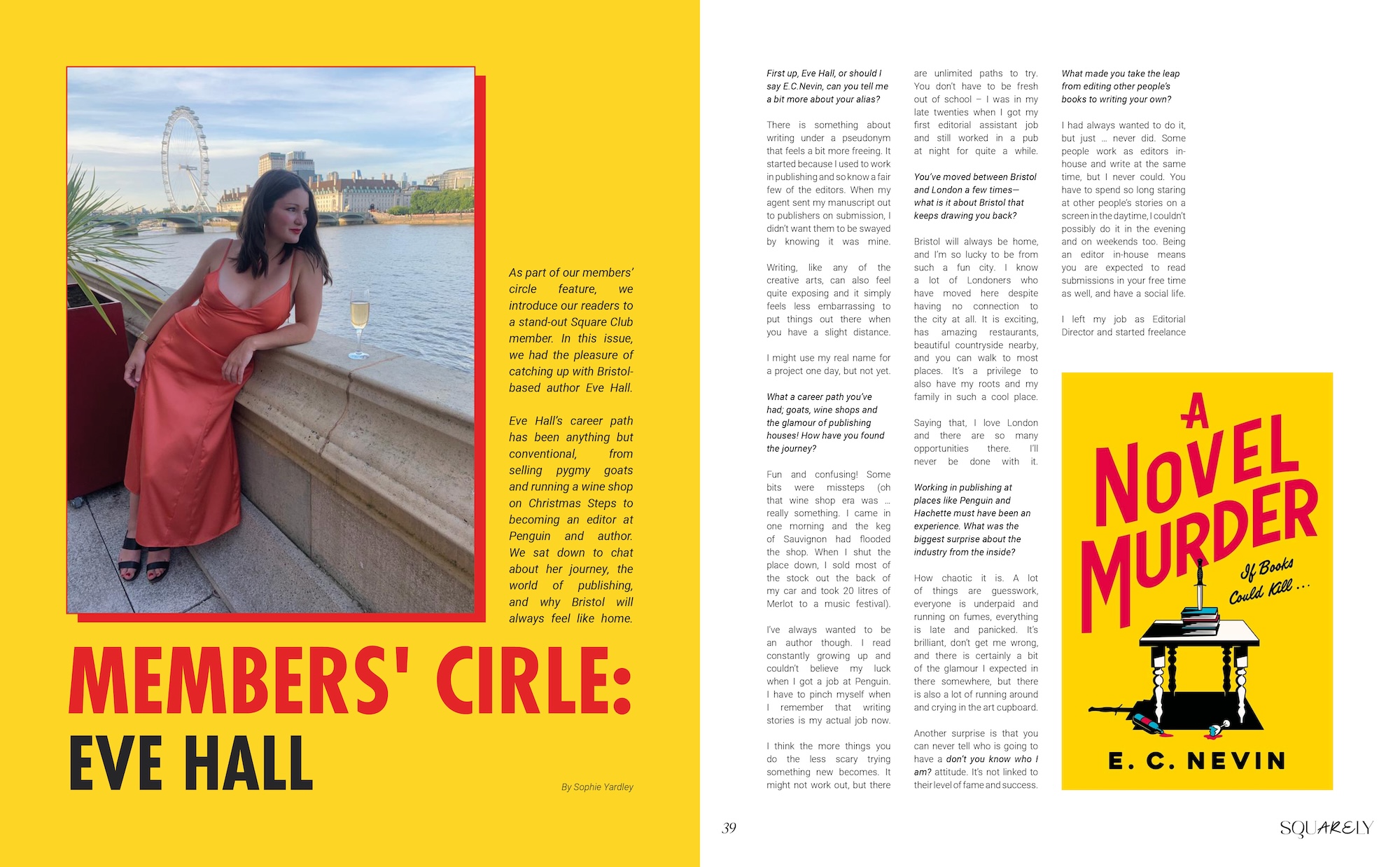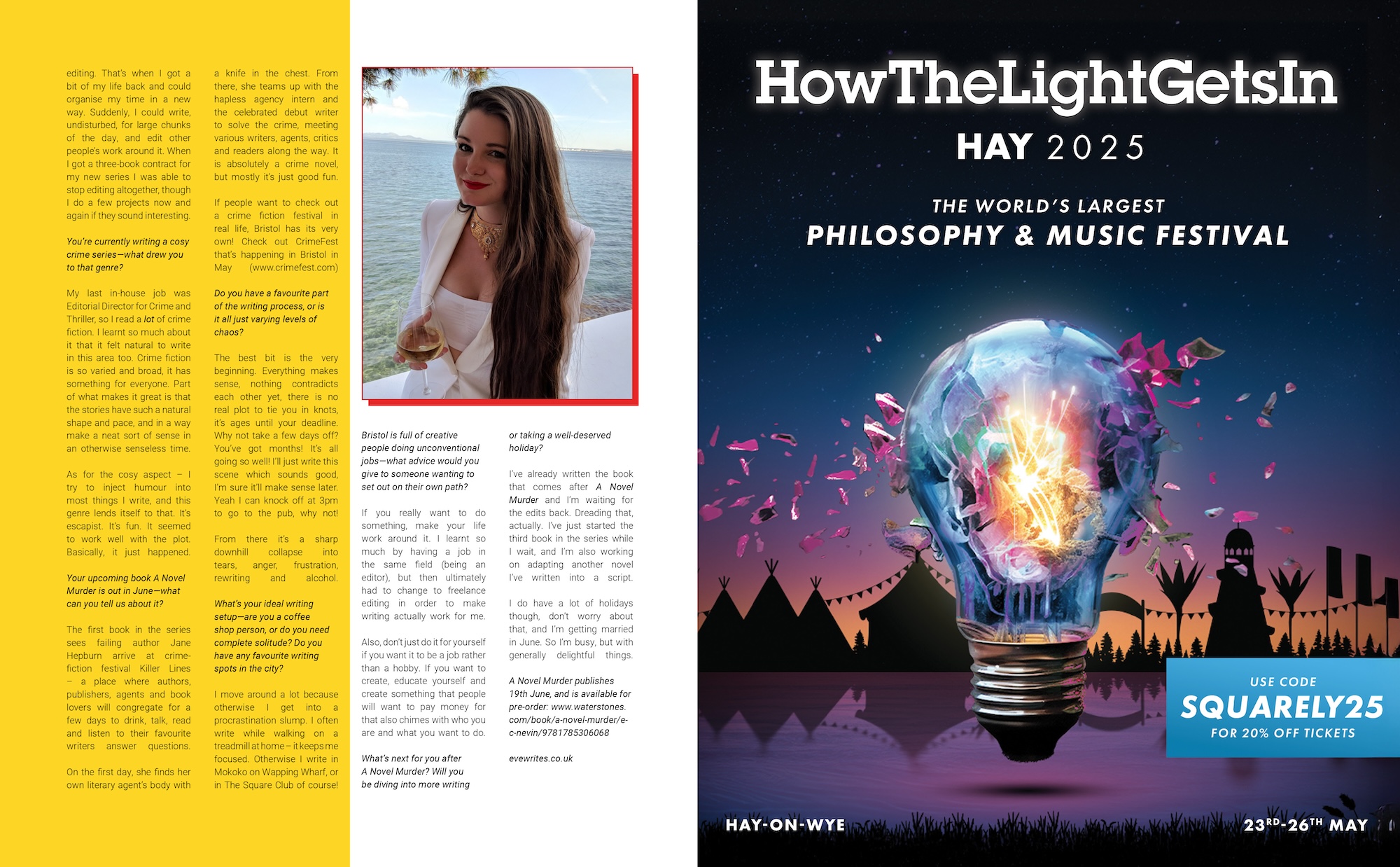As part of our members’ circle feature, we introduce our readers to a stand-out Square Club member. In this issue, we had the pleasure of catching up with Bristol-based author Eve Hall.
Eve Hall’s career path has been anything but conventional, from selling pygmy goats and running a wine shop on Christmas Steps to becoming an editor at Penguin and freelance author. We sat down to chat about her journey, the world of publishing, and why Bristol will always feel like home.
First up, Eve Hall, or should I say E.C.Nevin, can you tell me a bit more about your alias?
There is something about writing under a pseudonym that feels a bit more freeing. It started because I used to work in publishing and so know a fair few of the editors. When my agent sent my manuscript out to publishers on submission, I didn’t want them to be swayed by knowing it was mine.
Writing, like any of the creative arts, can also feel quite exposing and it simply feels less embarrassing to put things out there when you have a slight distance.
I might use my real name for a project one day, but not yet.
What a career path you’ve had; goats, wine shops and the glamour of publishing houses! How have you found the journey?
Fun and confusing! Some bits were missteps (oh that wine shop era was … really something. I came in one morning and the keg of Sauvignon had flooded the shop. When I shut the place down, I sold most of the stock out the back of my car and took 20 litres of Merlot to a music festival).
I’ve always wanted to be an author though. I read constantly growing up and couldn’t believe my luck when I got a job at Penguin. I have to pinch myself when I remember that writing stories is my actual job now.
I think the more things you do the less scary trying something new becomes. It might not work out, but there are unlimited paths to try. You don’t have to be fresh out of school – I was in my late twenties when I got my first editorial assistant job and still worked in a pub at night for quite a while.
You’ve moved between Bristol and London a few times—what is it about Bristol that keeps drawing you back?
Bristol will always be home, and I’m so lucky to be from such a fun city. I know a lot of Londoners who have moved here despite having no connection to the city at all. It is exciting, has amazing restaurants, beautiful countryside nearby, and you can walk to most places. It’s a privilege to also have my roots and my family in such a cool place.
Saying that, I love London and there are so many opportunities there. I’ll never be done with it.
Working in publishing at places like Penguin and Hachette must have been an experience. What was the biggest surprise about the industry from the inside?
How chaotic it is. A lot of things are guesswork, everyone is underpaid and running on fumes, everything is late and panicked. It’s brilliant, don’t get me wrong, and there is certainly a bit of the glamour I expected in there somewhere, but there is also a lot of running around and crying in the art cupboard.
Another surprise is that you can never tell who is going to have a don’t you know who I am? attitude. It’s not linked to their level of fame and success.
What made you take the leap from editing other people’s books to writing your own?
I had always wanted to do it, but just … never did. Some people work as editors in-house and write at the same time, but I never could. You have to spend so long staring at other people’s stories on a screen in the daytime, I couldn’t possibly do it in the evening and on weekends too. Being an editor in-house means you are expected to read submissions in your free time as well, and have a social life.
I left my job as Editorial Director and started freelance editing. That’s when I got a bit of my life back and could organise my time in a new way. Suddenly, I could write, undisturbed, for large chunks of the day, and edit other people’s work around it. When I got a three-book contract for my new series I was able to stop editing altogether, though I do a few projects now and again if they sound interesting.
You’re currently writing a cosy crime series—what drew you to that genre?
My last in-house job was Editorial Director for Crime and Thriller, so I read a lot of crime fiction. I learnt so much about it that it felt natural to write in this area too. Crime fiction is so varied and broad, it has something for everyone. Part of what makes it great is that the stories have such a natural shape and pace, and in a way make a neat sort of sense in an otherwise senseless time.
As for the cosy aspect – I try to inject humour into most things I write, and this genre lends itself to that. It’s escapist. It’s fun. It seemed to work well with the plot. Basically, it just happened.
Your upcoming book A Novel Murder is out in June—what can you tell us about it?
The first book in the series sees failing author Jane Hepburn arrive at crime-fiction festival Killer Lines – a place where authors, publishers, agents and book lovers will congregate for a few days to drink, talk, read and listen to their favourite writers answer questions.
On the first day, she finds her own literary agent’s body with a knife in the chest. From there, she teams up with the hapless agency intern and the celebrated debut writer to solve the crime, meeting various writers, agents, critics and readers along the way. It is absolutely a crime novel, but mostly it’s just good fun.
If people want to check out a crime fiction festival in real life, Bristol has its very own! Check out CrimeFest that’s happening in Bristol in May.
Do you have a favourite part of the writing process, or is it all just varying levels of chaos?
The best bit is the very beginning. Everything makes sense, nothing contradicts each other yet, there is no real plot to tie you in knots, it’s ages until your deadline. Why not take a few days off? You’ve got months! It’s all going so well! I’ll just write this scene which sounds good, I’m sure it’ll make sense later. Yeah I can knock off at 3pm to go to the pub, why not!
From there it’s a sharp downhill collapse into tears, anger, frustration, rewriting and alcohol.
What’s your ideal writing setup—are you a coffee shop person, or do you need complete solitude? Do you have any favourite writing spots in the city?
I move around a lot because otherwise I get into a procrastination slump. I often write while walking on a treadmill at home – it keeps me focused. Otherwise I write in Mokoko on Wapping Wharf, or in The Square Club of course!
Bristol is full of creative people doing unconventional jobs—what advice would you give to someone wanting to set out on their own path?
If you really want to do something, make your life work around it. I learnt so much by having a job in the same field (being an editor), but then ultimately had to change to freelance editing in order to make writing actually work for me.
Also, don’t just do it for yourself if you want it to be a job rather than a hobby. If you want to create, educate yourself and create something that people will want to pay money for that also chimes with who you are and what you want to do.
What’s next for you after A Novel Murder? Will you be diving into more writing or taking a well-deserved holiday?
I’ve already written the book that comes after A Novel Murder and I’m waiting for the edits back. Dreading that, actually. I’ve just started the third book in the series while I wait, and I’m also working on adapting another novel I’ve written into a script.
I do have a lot of holidays though, don’t worry about that, and I’m getting married in June. So I’m busy, but with generally delightful things.
A Novel Murder publishes on the 19th June, and is currently available for pre-order here.




